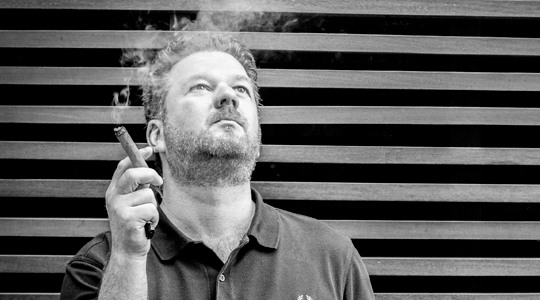Pole[DE]

Stefan Betke has helped define Berlin dub techno with his productions, DJing and label, ~scape. Well known for his minimalist re-configuration of Jamaican dub on the Blue, Red and Yellow albums at the turn of the decade, the Düsseldorf-born Betke has gone on to build dubstep alliances between Berlin and Bristol, collaborated with artists such as Four Tet and his fellows in the Pole Band and mentored emerging artists as part of CTM’s Berlin Current initiative.
Born in Düsseldorf, Betke spent a couple of years in Cologne before arriving in Berlin circa 1997. He was a mastering engineer at Dubplates and Mastering in Berlin, and works as a DJ, remixer and studio operator. The first release under the name ‘Pole’ appeared in 1998 on Torsten "T++" Pröfrock’s DIN label. The EP was called Raum Eins / Raum Zwei and was rumoured to have sprung from a gift Betke received in 1996 from Thomas Fehlmann and Gudrun Gut: a crash-damaged Waldorf-4-Pole filter. Betke found beauty in the static noise, and crafted it into a debut that became a statement of the Pole aesthetic for the next several years. Tanzen also appeared in 1998 on Hamburg Label Kiff SM - an eclectic sublabel of PIAS with boasting artists like Kreidler, Nonplace Urban Field and some German jungle/drum&bass acts. It was quickly followed by Betke’s debut long-player – the Blue album – part one of three. The second instalment, Red, was released in 1999 and the trilogy was completed in 2000 with Yellow.
In 1999 Betke, together with Barbara Preisinger, created the label ~scape and built up an impressive roster of artists that has included Kit Clayton, Jan Jelinek, Burnt Friedmann and Deadbeat.
By 2003, the Waldorf filter was retired and Pole released a series of hip-hop incursions on the Mute label (45/45, 90/90, and Pole), which used more traditionally electronic production and featured rapper Fat John. There were also countless remixes and production credits for artists such as Barbara Morgenstern, T.Raumschmiere, and productions projects like a Levis commercial. At the same time Pole travelled the globe with his powerbook, presented ~scape evenings in Berlin, ran ~scape’s music publishing arm, and did remixes of tracks from Egoexpress to Depeche Mode to John Tejada.
After many years of solo performance, Betke started to work with a band for live concerts in 2005, and began producing a sound substantially more organic and percussive and than his earlier releases. The Pole Band, comprised of Betke on electronics, Zeitblom on bass and Hanno Leichtmann on drums, gave lush and loud performances at MUTEK and CTM festivals in 2006.
Betke made another leap in 2007, definitively escaping the cul de sac of his early production style with the release of the critically acclaimed Steingarten, an album boasting a fuller sound, accompanied by live appearances including a rhythm section of bass guitar and drums. The album was followed up by the Steingarten Remixes that included reinterpretations from a range of artists including those close to the fold like Gudrun Gut, Deadbeat and The Mole, to Bristol dubsteppers Shackleton and Peverelist.
Pole and cohorts have since been instrumental in bringing British dubstep to Berlin through a series of live events, as well as 2008’s Round Black Ghosts compilation. His latest album, Wald, was released in 2015 and morphed into an audio-visual project with video artist MFO, in which Pole’s minimal song structures and complex sound design lends films and photographs – shot in the woods over a period of five years – a life of their own.


